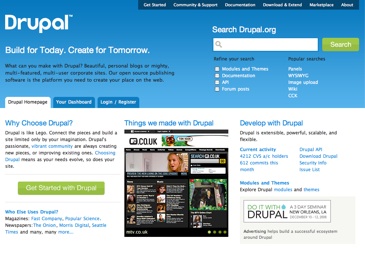In first of a series of posts, I'd like to go ahead and talk about project handling functionality, one of the most important tools behind Drupal.org. At this moment, Drupal.org is running Drupal 5, and a big chunk of modules which don't have a Drupal 6 version to migrate to on Drupal.org is the project module family: project (also includes project_release and project_usage), project_issue, pift_server, cvslog and even comment_upload.
Except the comment_upload module (which allows file uploads on comments in a general way), maintenance for these modules are headed by Derek Wright and Chad Phillips. An outstanding thing about these modules is that they keep improving and being adjusted to user needs. Automated testing integration tools were developed and keep improving, so patches submitted against Drupal 7 get automated testing. This is just plain great. However, all this huge amount of motion is going on in the Drupal 5 version of the module. And given that Drupal.org needs a stable environment, it takes considerable effort to maintain a stable Drupal 5 branch with all these feature improvements and changes coming in.
While these modules do not even have a Drupal 6 branch yet, Adam Light went ahead and worked on a Drupal 6 port for project module. He hosts this in his own private Subversion repository (see http://drupal.org/node/157694#comment-891587 and the rest of the comments there). Since he started off long ago from a then current version of the module and implemented Views integration (instead of the one-off SQL based pages in the Drupal 5 version), the Drupal 6 port has a largely refactored codebase and does not carry the improvements made to the Drupal 5 version since then.
The lead maintainers however are at this point more interested in working on a new stable release for Drupal 5, given that some bigger changes they are planning to make would be easier to manage on their own instead of as part of a bigger porting and migration work to a new Drupal version and to a Views based backend. This gets us to a message of "please help with a new stable Drupal 5 release of project module before Drupal 6 work can be considered". While these patches are relatively big, they are far from how big of a monster patch is the Drupal 6 upgrade. All-in-all the possibly awkward conclusion is that maintainers look for help with the Drupal 5 version before Drupal 6 work can be started.
For concrete action items, Adam Light summarizes it well:
Let me explain the situation a little here:
There are still some things that we'd like to get fixed in the Drupal 5.x branch of the project and project issue modules before we branch for Drupal 6. See http://groups.drupal.org/node/10865 and http://groups.drupal.org/node/16069. One big issue that affects all of project* land is #98278: project* namespace bugs in $node. The project* maintainers have agreed that it would be best to fix this problem *before* branching, because if we try to fix it during the port that will make testing the port even more difficult than it will be.
Creating a D6 branch itself will not really unblock things. Hunmonk or I could also do that ourselves. However, the ported code that is currently in my SVN repository contains a *lot* of changes, and all of us agree that those changes should not just blindly be checked into the project cvs repository without at least some review.
Yes, we all realize that this is a non-ideal situation, and that the port is moving much slower than anyone of us would like. The best way anyone could help move the port forward would be by helping to write or review patches for any issue not yet finished in the list of things to do before the next 5.x release. Mostly, that means reviewing the $node namespace patches in the issue I linked to above. The unfortunate part of this issue is that it is huge, but really boring. And none of the sites run by the project* maintainers use a combination of modules that actually causes this bug to reveal itself. But at the same time, we realize that lots of project* users *do* use such a combination of modules (eg. they use pathauto with project), and so we need to fix this bug soon.
So there are numerous big issues affecting Drupal.org which will be solved as part of the Drupal 6 port, but the main issue holding back the port from even starting is an issue which does not even affect drupal.org (and therefore is not going forward on any reasonable speed).
In summary, there are difficulties in how improvements on drupal.org are expected by some people right now instead of after an upgrade, and the maintainers are taking on work on these items; and issues not affecting drupal.org holding back our most important upgrade ever. So you can help at least three ways with the project module upgrade:
- Put away some of your cool feature ideas for project modules on drupal.org for now. Let's focus on porting and bugfixing or we are not going to get over new feature requests anytime soon.
- Help test patches against the Drupal 5 version of project modules to fix long standing bugs. See http://groups.drupal.org/node/10865 and http://groups.drupal.org/node/16069
- Help test and fix existing issues in the Drupal 6 port of project module. It at least has Views integration issues coming from the RC2 API changes in Views. See my pending patch at http://drupal.org/node/157694#comment-1069892 which still needs work.
We definitely need your help in many ways. Let's do good for the drupal.org upgrade / redesign!


